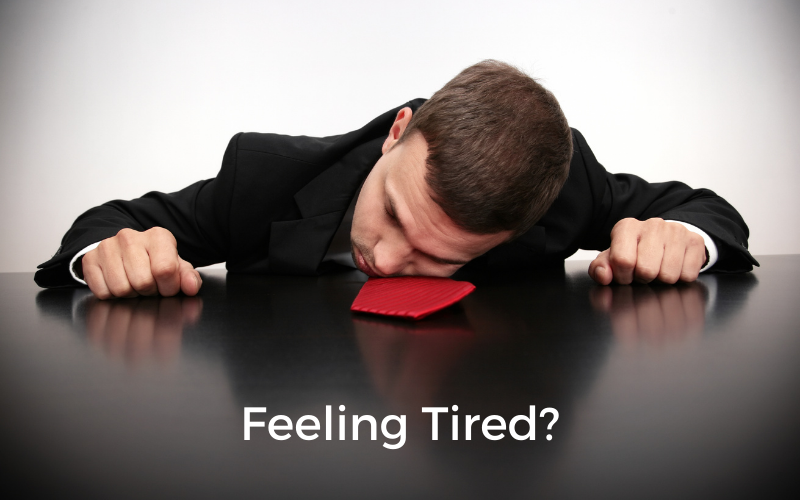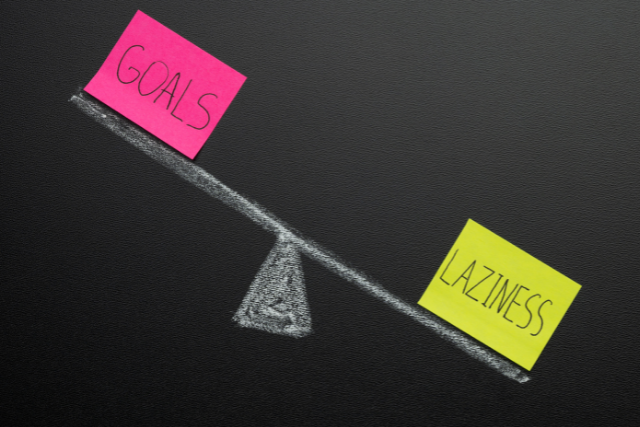Are you lazy, tired, or fatigued? How to know the difference

The rise in technological advancement has led to an inevitable outcome: the increased pace of the modern world. There is constant pressure to be better, do more, and not waste any precious moments. Yet, some days, you just cannot bring yourself to do it. You don’t feel like giving up your cosy blanket and getting out of your bed. It is natural to feel this way sometimes. However, in some cases, viewing yourself as lazy might give rise to low self-esteem and increased self-doubt.
But what if we told you that you are not lazy? What if you are fatigued or tired? How do you tell the difference? This blog will attempt to explain what these three terms mean and how chronic fatigue can be a problem.


Laziness
To put it in simple words, laziness refers to the unwillingness to work or use energy. It is finding comfort in being idle. It is seen as an undesirable trait in our society. In fact, many stereotypes are associated with laziness. Often a classist perspective blames poor people for their financial plight, presuming them to be lazy and “not working hard enough”. Likewise, laziness also tends to be associated with overweight people. In reality, however, all of us can be a little lazy sometimes.
Laziness can be caused by several psychological, evolutionary, or situational causes. Some of these include: –
- Human beings have an evolutionary instinct to conserve energy. This was essential for survival in times where physical energy was necessary to fight death. Presently, our needs for immediate survival have gone down which is why rest is not seen as desirable. However, the body and mind have a way of manifesting their resting needs in the form of laziness.
- Laziness is often associated with procrastination. One of the main causes human beings procrastinate is that we tend to avoid doing things that don’t give us immediate gratification. This makes us unwilling to do tasks that are important in the long term.
- Sometimes, laziness might indicate an underlying psychological disorder. For example, the inability and unwillingness to do everyday tasks is a major symptom of depression. Other neurotic disorders like anxiety and bipolar disorder may also lead to it.
- Fear of failure can be a situational factor that can lead to laziness.
- Stress, poor diet, lack of sleep, alcohol, physical disorders like anaemia are all causes that can lead to laziness.
How to overcome laziness
Being lazy once in a while does not cause much harm. However, if this becomes a widespread lifestyle problem, you might require an intervention. Here are some techniques to overcome laziness: –
- Set Realistic Goals. Unrealistic goals can make you work hard in an unachievable direction. This can lead to burnout. Burnouts typically lead to a loss of interest and motivation. It makes you anticipate failure and avoid doing anything. Setting small realistic goals is healthier and less overwhelming.


- Avoid Perfectionism. Research has shown that young people today feel an increased need to be perfect and better. There is more competition, more unrealistic expectations, and therefore an increased need for perfectionism and control. Try to recognize and accept your weaknesses so that you can manage them better.
- Create Elaborate Plans of Action. Work by taking one step at a time. Plan tasks out by writing down little steps. A series of small tasks are easier to do than having no direction or plan in a big task.
- Reward Yourself After Completing a Task. Associating a task with an immediate reward eliminates the chances of procrastination. Promise yourself to finish a task and then reward yourself after you’re done with something as simple as eating a pastry.
- Exercise and Diet. Poor lifestyle choices can take a toll on your mind and body. Eating high protein foods, regularly exercising, and staying hydrated can help you stay active.
Tiredness
Tiredness refers to the state of being weary and wanting rest. One feels low on energy and is therefore unable to do tasks. It accompanies a lack of stamina. However, being tired is natural and understandable. Usually, if a person is tired, taking some rest helps them restore their energy. People are aware of why they are tired because the causes can be put together easily. Some causes of tiredness include: –
- Lack of Sleep
- Overexertion
- A full day of working
- Skipped meals
- Dehydration
- Illness
How to overcome tiredness
Since being tired is a straightforward problem, its solutions are pretty obvious. It is not a medical condition. The only thing one has to be careful about is not letting tiredness accumulate over time and taking appropriate measures to manage it daily. Here are some common ways to overcome tiredness: –
- Take a nap or a break from work.
- Hydrate yourself.
- Practice relaxation techniques
- Eat a high protein meal
- Engage in a good night’s sleep
Fatigue
Fatigue is a mental and/or physical state characterized by a lack of motivation and energy, Tiredness, laziness and fatigued. Fatigue itself tends to be a symptom of an underlying mental or physical disease. It is not the same as being tired because you are tired “all the time.” Getting enough rest might still not help a fatigued state.
Fatigue is frequently a symptom with a gradual onset, meaning it worsens over time. Many people might dismiss fatigue as a frequent thing, blaming it on age, being too busy or overworked, and not getting enough sleep. While the causes and severity in forms of fatigue range from mild to severe, it usually does not get treated until the root of it is treated. Prolonged neglect can lead to worsened fatigue. This is why it is important to recognize it when you suffer from it.


Severe fatigue spreads all over the functioning of an individual’s life. They may become maladaptive and be unable to do simple daily tasks. This can lead to professional, personal, and psychological problems.
Causes of fatigue
Fatigue usually manifests as a symptom of an underlying problem. This can be medical, psychological, or lifestyle-related.
Medical causes
A wide range of physical causes can lead to fatigue. These include:
- Metabolic conditions like anaemia, diabetes, liver/kidney diseases
- Endocrine problems such as hormonal imbalances
- Sleep disorders such as insomnia, hypersomnia, sleep apnea
- Certain medications
- Infections or fevers such as malaria, tuberculosis
- Cardiac problems, respiratory diseases, cancer, autoimmune diseases
Psychological causes
- Mental Health problems tend to be a common cause of fatigue. Usually, this includes neurotic conditions like depression, anxiety, and bipolar disorder. Clinical conditions of these disorders need to be treated by mental health professionals.
- Stress is a factor that leads to mental and physical exertion. Accumulated stress can lead to fatigue and eventually complete burnout. Stress can be caused by overworking, toxic relationships, environmental factors, and so on. For conditions where one can’t control a stressor, relaxation techniques are recommended.
Lifestyle causes
- People who work night shifts tend to commonly face daytime fatigue. This is because the human body is not designed to work at night. Getting enough rest is essential for good health.
- Constant Sleep Disturbances: Lately, staying up late has become a lifestyle choice for many. While missing a few hours here and there can be compensated for, prolonged sleep deprivation and disturbance lead to fatigue.
- Alcohol consumption leads to the slowing down of the nervous system and in turn, may leave you feeling fatigued.


- Drugs like caffeine keep you awake for longer than you should stay awake and disturb sleep in the long run.
- Diet: Eating high-carb quick-fix foods might be convenient but they take a toll on the body. These foods do not have enough protein and nutrients that the human body needs to function, leading to fatigue.
How to identify fatigue?
Fatigue accompanies several mental and physical symptoms. The chief features of fatigue include: –
- Inability to start a task
- Getting tired easily after starting a task
- Concentration and memory problems
- Inability to finish tasks
Other symptoms of fatigue include: –
- Constant tiredness
- Headache
- Slowed reaction times and reflexes
- Irritability, as well as moodiness
- Loss of appetite
- Poor concentration and attention problems
- Problems with memory
- Weakness
- Lack of motivation
Can fatigue be diagnosed?
Fatigue can be mild and a temporary part of prolonged stress. When the stress is gone, the fatigue is also gone. However, it so happens that many times it gets prolonged. Chronic fatigue syndrome (CFS) is diagnosed when a person has had chronic and continuous exhaustion for six months or longer with no known cause, which does not improve with sleep or rest and worsens with physical or mental exertion. Chronic fatigue has an impact on a person’s day-to-day functioning and quality of life, regardless of the cause.
A diagnosis can be made for fatigue, but this condition can be vague and difficult to identify. It overlaps with many conditions. Often fatigued people describe themselves as depressed, anxious, or just tired. How one describes their symptoms can affect diagnosis. If you are diagnosed with fatigue, your medical professional will likely try to determine the cause of it. This is generally done by examining medical history, performing tests, and physical examinations.
When to see your doctor?
Here are a few of the many possible signs that you should see your doctor.
- Your fatigue is not alleviated by rest, sleep, or removing stressors.
- You have started to feel fatigued suddenly and you do not know what could have caused it.
- You have had feelings of exhaustion continuously for over six months and it has gotten worse and worse.
- You have feelings of excessive weakness that may or may not be accompanying fainting or near-fainting.
- You have experienced a significant loss of weight for no apparent reason.
- You have difficulty falling or staying asleep on a daily basis.
- You feel so tired that you believe you are depressed.
Treatment of serious fatigue-related problems is generally done by finding the cause of fatigue. Further, medical professionals might suggest lifestyle changes for you to avoid feeling fatigued.
How to overcome fatigue by yourself
If you have had fatigue for a prolonged period, life is likely to be stressful for you. Overcoming fatigue might seem like the biggest task for someone who can barely gather energy to do simple tasks. But you don’t have to feel overwhelmed trying to overcome it. One step at a time, making appropriate lifestyle changes might help you a lot. Here are a few ways you can get started: –
Pay attention to your diet
This is important because fatigue is often accompanied by weakness. Add protein-rich foods to your diet and never compromise on a healthy meal over easy availability. Your body must get the nutrients it needs.
Exercise
For fatigued people, even hearing the word “exercise” can be dreadful. However, this is precisely why you need exercise. Exercise has been proved to improve mood, general health, and performance in day-to-day activities. You don’t have to start doing high-intensity workouts. Instead, start by going on a walk every morning. Gradually, involve little workouts in your routine.


Stay hydrated
We hear the suggestion of drinking water to solve health problems so much that we tend to get immune to that suggestion. But believe it or not, drinking enough water is very necessary for a healthy mind and body. Water helps almost all of your bodily functions whether it’s digestion or blood circulation. A hydrated body has more energy and tends to not be lethargic. Make sure you drink at least 10 glasses of water every day.
Get out of your house more often
The pandemic has made us used to stay indoors. More activity can be exactly what many may need to feel charged. Attempt to pull yourself out of your blanket and meet your friends. Try going to a party, or engaging in a fun game. Laughing, gossiping with friends, going on an adventure can make you feel more active. You can also use spending time with your friends as a reward for yourself after you are done doing necessary tasks. This can make difficult or boring tasks more tolerable.
Final word
We hope that the definitions of laziness, tiredness, and fatigue are clearer to you with this reading. Life can be stressful for us all and there is no need to feel like you are alone in dealing with it. Whether you believe you are lazy, tired, or fatigued; know that it is okay to be overwhelmed at times. We wish you all the best in overcoming either of these issues.









